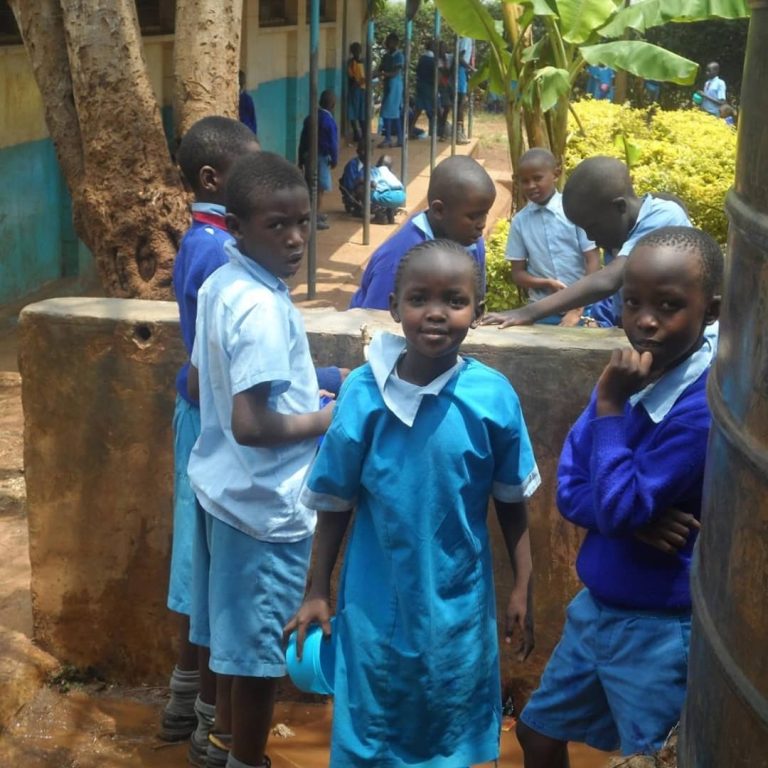Period poverty, a global issue that affects millions of women and girls, is often overlooked and under-discussed.
It refers to the inability to access sanitary products due to financial constraints, leading to significant health and social implications.
This article aims to shed light on this pressing issue, focusing on the importance of addressing period poverty and the various initiatives to combat it.

Understanding Period Poverty
Period poverty is a term that encapsulates the struggles many women and girls face due to a lack of access to sanitary products, basic sanitation, and menstrual hygiene education.
According to the World Bank, millions of women and girls globally lack adequate facilities to manage their menstruation, with a significant number unable to afford period products.
This issue is not confined to developing countries; it is a global problem that requires immediate attention.
In 2023, the Menstrual Hygiene Day theme is making menstruation a normal fact of life by 2030.
The overarching goal is to build a world where no one is held back because they menstruate by 2030. This year’s hashtag is #WeAreCommitted, symbolizing a collective commitment to addressing this issue.
Period poverty is more than just a financial issue; it’s a matter of dignity, health, and equality. It affects education, as girls who can’t manage their periods are more likely to miss school, and it impacts women’s ability to work.
Also read: Empowering Women, One Reusable Sanitary Pad at a Time: The Revolutionary Sanitary Pad Project
It’s a barrier to gender equality, and it’s a violation of basic human rights.
The World Bank estimates that 500 million women lack access to adequate facilities for menstrual hygiene management. In sub-Saharan Africa, for instance, a survey found that one in ten girls missed school during their period. In India, it’s estimated that 23% of girls drop out of school once they start menstruating.
Addressing period poverty requires a multi-faceted approach. It involves breaking down the stigma surrounding menstruation, providing access to affordable sanitary products, improving sanitation facilities, and providing comprehensive menstrual hygiene education.
It’s a collective effort that requires the involvement of everyone – from individuals to organizations, and from local communities to governments.
As we move towards 2030, we must remain committed to making menstruation a normal fact of life, ensuring that no one is held back because they menstruate.
The fight against period poverty is a fight for dignity, equality, and human rights. It’s a fight we must all be committed to. #WeAreCommitted.
Also read: Breaking Stigma: Discover the World of Menstrual Hygiene
Period Poverty in Developing Countries

Period poverty is a particularly dire issue in developing countries, where access to sanitary products and adequate sanitation facilities is often limited.
In Kenya, for instance, up to 65% of women and girls cannot afford menstrual products. This lack of access to sanitary products often leads to absenteeism from school and work, perpetuating the cycle of poverty.
In fact, a Kenyan study found that 95% of menstruating girls missed 1-3 school days per month, with over 50% stating that they fell behind in school due to menstruation.
The impact of period poverty extends beyond education. It affects the health and wellbeing of these girls and women, leading to social exclusion and limiting their opportunities for economic empowerment.
The inability to manage menstruation with dignity can also lead to stigma and discrimination, further exacerbating the challenges these girls and women face.
Period poverty projects are crucial in these contexts.
They not only provide access to sanitary products but also work towards improving sanitation facilities and providing menstrual hygiene education.
These initiatives are instrumental in breaking the cycle of poverty and empowering girls and women.
However, addressing period poverty in developing countries requires a multi-faceted approach.
It involves tackling the cultural taboos and social myths surrounding menstruation, advocating for policy changes to make sanitary products more affordable and accessible, and raising awareness about the importance of menstrual hygiene.
As we move towards 2030, the goal is to make menstruation a normal fact of life, ensuring that no girl or woman is held back because they menstruate.
This is a commitment we must all make. The fight against period poverty is a fight for dignity, equality, and human rights.
It’s a fight we must all be committed to.
#WeAreCommitted.
Also read: Empowering Women on World Menstrual Hygiene Day: Awareness, Education, and Breaking Taboos
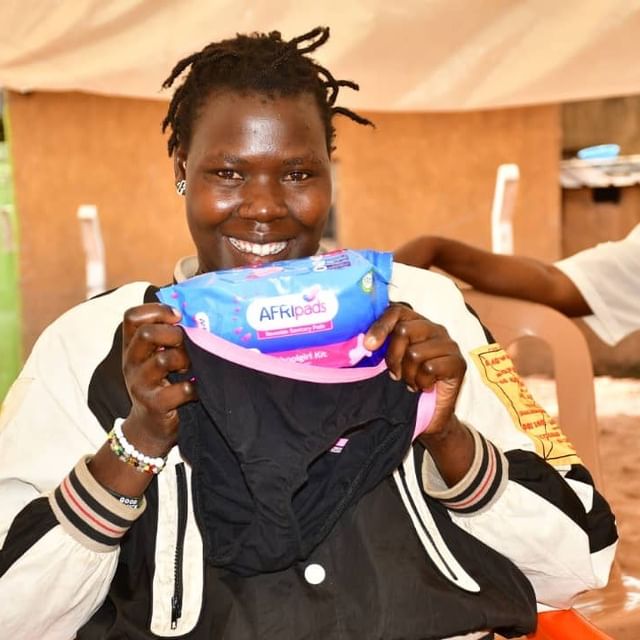
The Role of Menstrual Health and Hygiene in Empowering Women
Menstrual health and hygiene are fundamental to the empowerment of women and girls.
Proper menstrual health management can contribute to increasing female empowerment, particularly during a critical stage of a girl’s life.
However, failing to address this can lead to severe consequences, including health complications and social exclusion.
According to the United Nations Population Fund, each day, some 800 million people between the ages of 15 – 49 are menstruating.
Yet, in some countries, menstruation is taboo or riddled with myths, leading to women and girls being excluded from daily activities due to stigma, shame, or discrimination.
This exclusion can have significant impacts on their education, health, and overall quality of life.
In some societies, the onset of menstruation can lead to child marriage or sexual violence, as it is wrongly interpreted as a sign that a girl is ready for motherhood or sexual activity.
Girls may miss school because they do not have access to sanitary supplies, they are in pain, or their schools lack adequate sanitary facilities.
Moreover, more than 26 million women and girls are estimated to be displaced because of conflict or climate disaster, exacerbating their vulnerability and robbing them of dignity when they have difficulty managing their periods.
While some countries have addressed period poverty, or the hardship of affording menstrual products, more can be done, especially in normalizing something 1.9 billion people of reproductive age do – girls, women, transgender men, and nonbinary people.
Menstruation should not mean the end of rights to health, dignity, and gender equality. It’s a fight we must all be committed to. #WeAreCommitted.
The Taboo Surrounding Menstruation
Despite being a natural biological process, menstruation is often surrounded by cultural taboos and social myths.
These barriers make it difficult for individuals to discuss menstruation, leading to misinformation and stigma openly. This lack of open conversation further exacerbates the challenges faced by women and girls in managing their menstrual health.
In many societies, menstruation is considered unclean or impure, leading to women and girls being excluded from daily activities during their period.
This stigma can have significant impacts on their mental and physical health, as well as their education and social participation.
Moreover, the silence surrounding menstruation often leaves girls unprepared for their first period, leading to fear and confusion.
It also prevents them from seeking help when they face issues related to menstruation, such as menstrual pain or irregular periods.
Breaking the taboo surrounding menstruation is crucial in addressing period poverty. By normalizing menstruation and promoting open conversation about it, we can ensure that women and girls have the information and support they need to manage their menstruation with dignity.
It’s a fight we must all be committed to. #WeAreCommitted.
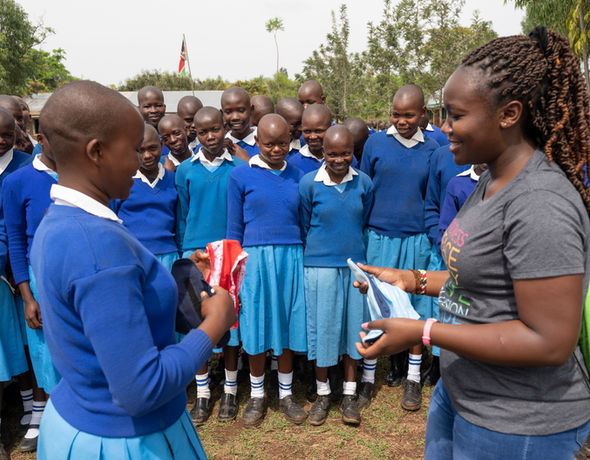
Period Poverty Projects
Various period poverty projects worldwide are working tirelessly to address the pressing issue of period poverty.
These projects, driven by a commitment to gender equality and human rights, aim to provide access to sanitary products, improve sanitation facilities, and offer menstrual hygiene education.
While these projects have made significant strides, they continue to face challenges, including cultural barriers and limited resources.
One such initiative is Padmad, a company that manufactures reusable sanitary pads. Padmad’s mission is to provide affordable and eco-friendly menstrual products to girls and women worldwide.
By offering a sustainable alternative to disposable sanitary products, Padmad not only addresses period poverty but also contributes to environmental conservation.
In collaboration with Padmad, Maji na Ufanisi, a Kenyan NGO dedicated to providing clean water, sanitation, and hygiene solutions to low-income communities, is making a difference in the lives of adolescent and school-going girls.
During World Menstrual Hygiene Day, they provide girls with reusable sanitary pads and menstrual hygiene education, putting a smile on their faces.
There are numerous ways to participate in World Menstrual Hygiene Day celebrations and events. You can donate to organizations like Maji na Ufanisi, and raise awareness on social media using the hashtag #WeAreCommitted.
By supporting these initiatives, we can collectively work towards improving menstrual hygiene conditions for girls and women, not just in Kenya, but globally.
Together, we can make menstruation a normal fact of life, ensuring that no one is held back because they menstruate.
#WeAreCommitted.
Also read: The Power of Period Education: Unlocking Potential on World Menstrual Hygiene Day
Solutions to Period Poverty
Education plays a pivotal role in combating period poverty. By educating individuals about menstruation, we can break down the stigma surrounding it.
Additionally, providing access to affordable menstrual products is crucial. Innovative solutions, such as reusable sanitary pads and menstrual cups, offer sustainable and cost-effective alternatives.
According to Global Citizen, poor menstrual hygiene can cause physical health risks and has been linked to reproductive and urinary tract infections.
Globally, 1.7 billion people live without basic sanitation services. Girls with disabilities disproportionately do not have access to the facilities and resources they need for proper menstrual hygiene.
Period poverty projects are making a difference. For instance, organizations like MINA Foundation provide young women with menstrual products to help them stay in school.
On a global level, the Sanitation and Hygiene Fund is working to improve sanitation and hygiene for the most vulnerable populations, supporting countries to increase “inclusive and sustainable access” to improved sanitation, hygiene, and menstrual health and hygiene (MHH) as a human right.
We can all contribute to the solution. Donate to organizations working on period poverty projects, share this blog with others sympathetic to the cause, and raise awareness about this pressing issue.
Together, we can make a difference.
#WeAreCommitted.

Period Poverty Awareness Week 2023
Period Poverty Awareness Week 2023 serves as a crucial platform to raise awareness about this pressing issue.
Through various activities and initiatives, the week aims to educate the public about period poverty, break down the stigma surrounding menstruation, and advocate for policy changes to address it.
This week is not just about raising awareness; it’s about sparking conversations and inspiring action.
Whether you’re in Kenya, Africa, the US, Canada, the EU, the UK, Australia, or New Zealand, you can make a difference. Engage in conversations about period poverty, share your knowledge, and challenge misconceptions.
As we approach Sunday, May 28th, Menstrual Health Day, let’s intensify our efforts.
Let’s use our voices to advocate for change, our actions to make a difference, and our platforms to spread the word.
Together, we can combat period poverty and ensure that no one is held back because they menstruate.
#WeAreCommitted.
Also read: Empowering Women on World Menstrual Hygiene Day: Awareness, Education, and Breaking Taboos
The Period Poverty Project
The Period Poverty Project is a notable initiative aimed at combating period poverty. Through a combination of education, advocacy, and provision of sanitary products, the project has made a significant impact and continues to work towards its goal of ending period poverty.
One of the key initiatives under the Period Poverty Project is the collaboration between Padmad and Maji na Ufanisi, a Kenyan NGO dedicated to providing clean water, sanitation, and hygiene solutions to low-income communities.
This project focuses on providing reusable sanitary pads to girls in public schools in Kenya, targeting over 100,000 adolescent girls.
In addition to providing sanitary pads, the project also includes an education and awareness component.
Adolescent boys are included in this aspect of the project, promoting a more inclusive and comprehensive approach to menstrual hygiene education.
As part of the campaign, donated underwear is also distributed.
The work of the Period Poverty Project, particularly the reusable sanitary pad initiative, is a testament to the power of innovative, sustainable solutions in addressing period poverty.
By providing access to sanitary products and education, the project is not only addressing immediate needs but also empowering girls and women for the future.
As we continue to raise awareness and advocate for policy changes, let’s remember the importance of supporting initiatives like the Period Poverty Project.
Let’s contribute to the solution, whether by donating, volunteering, or simply spreading the word.
Together, we can make a difference. #WeAreCommitted.
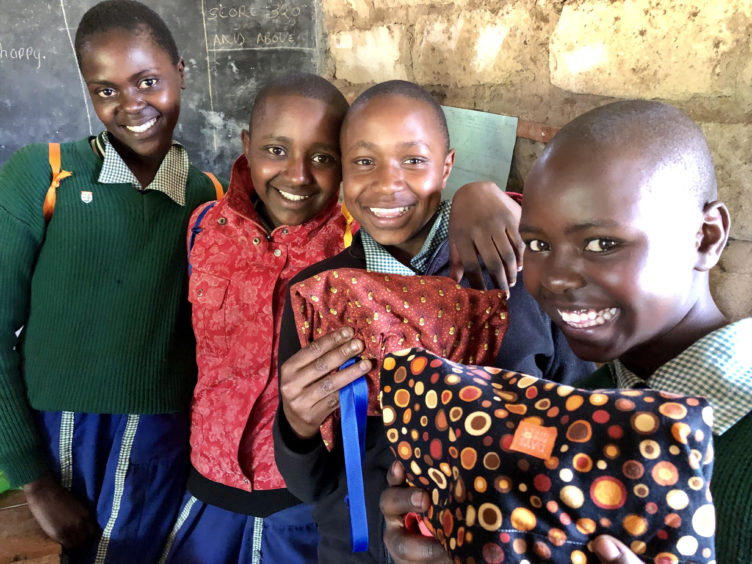
Period Poverty in Schools
Period poverty significantly affects school attendance rates among girls. Without access to sanitary products, many girls opt to stay home during their period.
To address this, schools need to provide sanitary products and adequate sanitation facilities and incorporate menstrual hygiene education into their curriculum.
A shining example of this is Mwiki Primary, a school in the Githurai sub county, Kiambu County, Kenya.
Here, Maji na Ufanisi, in partnership with Padmad and GT Bank Kenya, is making a significant difference. They are set to donate over 3000 reusable pads, educate on best practices, and fight against stigma.
This initiative is not just about providing sanitary products; it’s about empowering girls through education and breaking down the barriers that menstruation often brings.
This initiative is a testament to the power of collaboration and the impact of comprehensive solutions.
By addressing the issue of period poverty from multiple angles – provision of sanitary products, education, and stigma reduction – they are creating an environment where girls can manage their menstruation with dignity and continue their education uninterrupted.
As we continue to raise awareness about period poverty, let’s remember the importance of initiatives like these.
Let’s support them, whether by donating, volunteering, or simply spreading the word. Together, we can ensure that no girl is held back from her education because of her period.
#WeAreCommitted.
Ending Period Poverty
Ending period poverty is a global mission that requires concerted efforts from all stakeholders.
It’s not just about providing sanitary products; it’s about creating an environment where menstruation is not a barrier to a girl’s or woman’s progress.
In Kenya, Maji na Ufanisi and Padmad are leading the charge against period poverty. They are working together to provide reusable sanitary pads to girls and women, particularly in low-income communities.
Their project is not just about providing sanitary products; it’s about empowering women and girls, breaking the stigma around menstruation, and promoting menstrual hygiene.
But they are not alone in this fight. Across Africa, several other projects are making significant strides in combating period poverty.
For instance, the Binti Period project in South Africa is working to provide menstrual education and affordable sanitary products to girls and women.
In Uganda, the Days for Girls project is empowering girls and women with access to quality sustainable feminine hygiene and awareness through health education.
In Zimbabwe, the Katswe Sistahood is advocating for the rights of girls and young women and providing menstrual health management education. And in Nigeria, the Sanitary Aid for Nigerian Girls project is providing sanitary products to girls who can’t afford them.
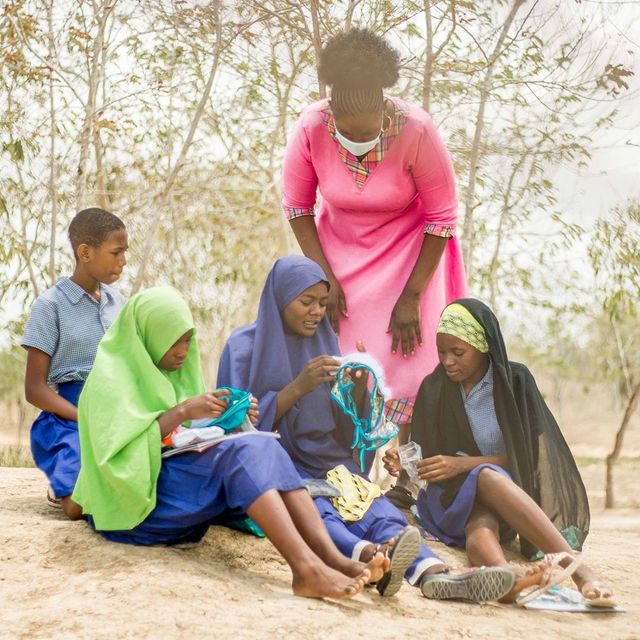
These projects, among others, are significantly impacting their respective countries.
However, they face numerous challenges, including cultural barriers, limited resources, and policy constraints. But with continued support and advocacy, they are making progress towards their goal of ending period poverty.
In the words of Maji na Ufanisi, “We are committed to putting a smile on adolescent and school-going girls’ faces.”
And indeed, every reusable sanitary pad they provide, every menstrual hygiene education session they conduct, brings us one step closer to a world where no girl or woman is held back because of her period.
Let’s join them in this mission.
Let’s raise awareness, donate to these causes, and do our part in ending period poverty. Because every girl and every woman deserves to menstruate with dignity.
Unveiling the Stark Reality: Eye-Opening Statistics on Global Period Poverty
Statistics about period poverty paint a grim picture of the challenges faced by millions of women and girls worldwide.
According to UNICEF, 1 in 10 girls in Africa miss school during their period. This is a significant barrier to education and empowerment, perpetuating a cycle of poverty and inequality.
In India, the situation is equally concerning. A shocking 23% of girls drop out of school once they start menstruating, according to a report by the Indian Ministry of Health.
The lack of access to sanitary products and the stigma surrounding menstruation often leaves these girls with no choice but to abandon their education.
In Bangladesh, many families cannot afford menstrual products and resort to using old clothing, according to UNICEF.
This not only poses significant health risks but also contributes to the stigma and shame associated with menstruation.
The situation is not much better in developed countries. In the US, a study from 2017 showed that nearly 1 in 5 girls had missed school due to a lack of access to period products.
It was only in 2018 that US federal prisons made menstrual products free.
These statistics highlight the urgent need to address period poverty.
It’s a global issue that requires global solutions. From policy changes to cultural shifts, we all have a role to play in ensuring that no girl or woman is held back because of her period. #WeAreCommitted.
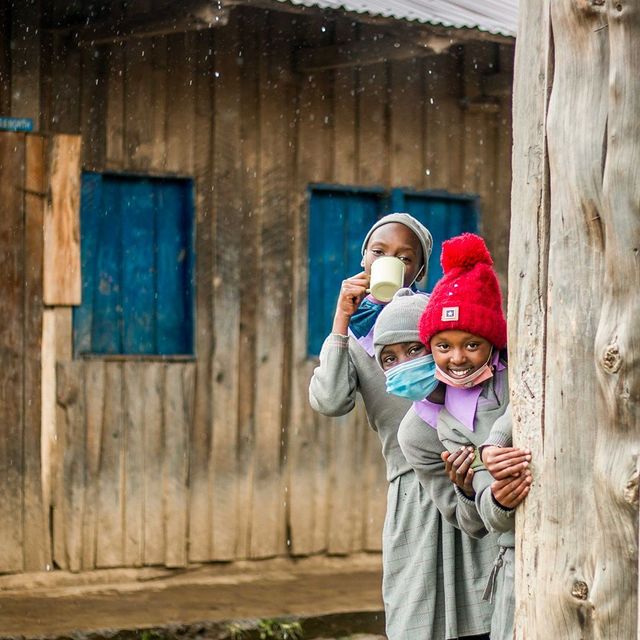
The Fight Against Period Poverty Continues
Period poverty is a global issue that affects millions of women and girls. It’s a barrier to education, employment, and empowerment.
But with concerted efforts and innovative solutions, we can make a difference. Period poverty projects, like those led by Maji na Ufanisi and Padmad, are making significant strides in addressing this issue.
However, the fight against period poverty is far from over. It requires the collective efforts of governments, organizations, and individuals like you.
Your contribution can make a significant difference in the lives of girls and women affected by period poverty.
Consider donating to Maji na Ufanisi.
Just $10 can provide a girl with reusable, environmentally friendly pads from Padmad for the next five years, helping her avoid shame and continue her education uninterrupted.
Let’s join hands in this fight against period poverty.
Together, we can ensure that no girl or woman is held back because of her period.
#WeAreCommitted.
FAQs
- What is period poverty?
Period poverty refers to the lack of access to sanitary products, menstrual hygiene education, toilets, hand washing facilities, and/or waste management. It’s a global issue that affects millions of women and girls.
- What are some of the impacts of period poverty?
Period poverty can lead to health issues, absenteeism from school or work, and social exclusion. It can also perpetuate the cycle of poverty and inequality.
- What are period poverty projects?
Period poverty projects are initiatives aimed at addressing period poverty. They often involve providing access to sanitary products, improving sanitation facilities, and providing menstrual hygiene education.
- What is being done to address period poverty in Kenya?
Organizations like Maji na Ufanisi and Padmad are working to combat period poverty in Kenya. They provide reusable sanitary pads to girls and women, particularly in low-income communities, and provide menstrual hygiene education.
- What is the Period Poverty Awareness Week 2023?
Period Poverty Awareness Week 2023 is a week dedicated to raising awareness about period poverty. It involves various activities and initiatives aimed at educating the public about period poverty and advocating for policy changes to address it.
- How can I contribute to the fight against period poverty?
You can contribute by donating to organizations working on period poverty projects, raising awareness about the issue, and advocating for policy changes.
- What is the significance of reusable sanitary pads?
Reusable sanitary pads are a sustainable and cost-effective alternative to disposable sanitary products. They not only address period poverty but also contribute to environmental conservation.
- What is the role of education in combating period poverty?
Education plays a crucial role in combating period poverty. By educating individuals about menstruation, we can break down the stigma surrounding it and promote menstrual hygiene.
- What is the goal of the Period Poverty Project?
The goal of the Period Poverty Project is to end period poverty. This involves providing access to sanitary products, improving sanitation facilities, and providing menstrual hygiene education.
- How can I donate to Maji na Ufanisi?
You can donate to Maji na Ufanisi through their website. Your donation can help provide a girl with reusable sanitary pads for the next five years.

